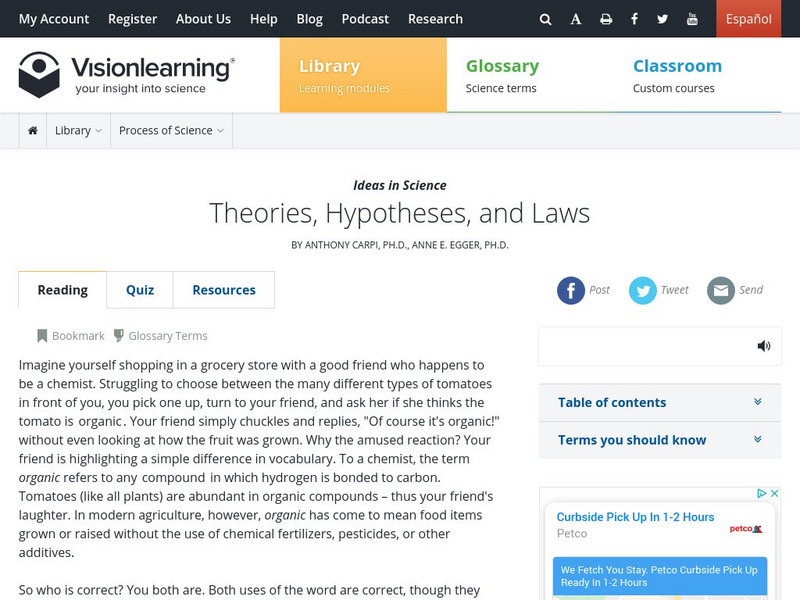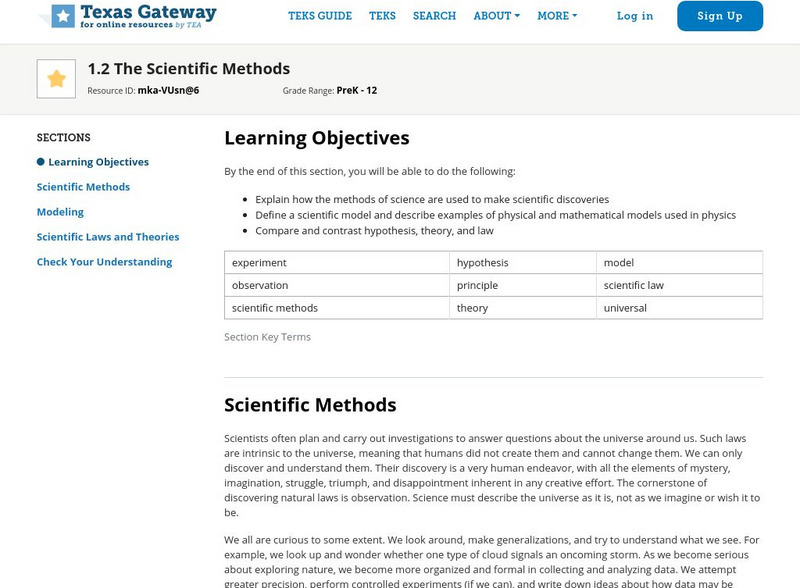Curated OER
The Story of the Atom
For this atom worksheet, students read about the model of the atom developed by Neils Bohr. Students complete 2 short answer questions based on what they read.
Curated OER
Ocean Currents
Fourth graders work in groups to research ocean currents and create posters with their findings. They locate the patterns and names of major ocean currents and identify them on a map. Students also use red pencil to show ocean currents...
Curated OER
Evolution of Stars
In this stars worksheet, high schoolers review the different types of stars by filling in the blank of 14 statements. Students then find those terms in a word search.
Curated OER
Phosphate Testing Contract
Students examine how to prepare an experimental procedure. In this scientific method lesson students conduct an investigation on phosphate.
Curated OER
Keep the Environment Clean
Students discuss ways our environment becomes polluted. They make a list of ways to keep it clean.
Curated OER
Oceanography: Understanding the Relationship Among Ocean Food Chains
Fourth graders explore relationships among organisms involved in ocean food chains to investigate interdependence of the organisms.
Curated OER
Cells
Seventh graders look up pictures of viruses or pictures of models of viruses. Using pipe cleaners, beads, Styrofoam or other available materials make models of these shapes. They then observe a demonstration to show the effect of Tobacco...
Curated OER
Alfred Einstein
In this famous person worksheet, students read a passage about Albert Einstein and then complete a variety of in-class and homework activities to support comprehension, including partner interviews, spelling, cloze, synonym...
Curated OER
The Invention of Faraday Cage
Young scholars demonstrate how Faraday's cage work by building their own electroscope. In this physics lesson, students explain how Faraday's cage work. They cite several applications of this principle in the real world.
Curated OER
Combustion Reactions
Students write a balanced chemical reaction. They articulate how burning fossil fuels increase the carbon dioxide levels in the atmosphere. Students incorporate all the environmental risks involved as well.
Curated OER
Belfy Word Search
In this language arts worksheet, students study 20 words in a word bank, then locate them in a word search puzzle. The words appear to be related to chemistry but the meaning of the title is not known.
Curated OER
The Sum of the Parts
Second graders observe some everyday common objects in order to attempt to learn about simple systems and how they fit together. They observe small details in order to identify the parts of a whole design.
Curated OER
Animals
Second graders discuss the term "endangered". They identify the reasons some animals are in danger of being wiped out. They discover ways humans can help the species survive.
Curated OER
Exploring the Celestial Neighborhood
Ninth graders study the origin and organization of the solar system. They investigate the Earth's place in the system and how planetary motions explain natural phenomena observable from Earth.
Curated OER
Numerical Determination of Drag Coefficients
Pupils create a video of an object falling with a drag. In this physics lesson plan, students calculate drag coefficient using data from Logger Pro. They calculate velocity and acceleration of the object.
Curated OER
#22 Frames of Reference: The Basics
Students explore the concept of frames of reference in physics.
Curated OER
Frames of Reference: The Basics
Students learn the concept of frames of reference in physics. They examine how two frames of reference, each moving with respect to the other with a constant velocity v (constant speed, constant direction).
Curated OER
Scientific Inquiry: Periodic Motion
Students construct their own pendulum. In this physics lesson, students design an experiment to find the factors affecting its period. They formulate a conclusion based on experimental data.
Curated OER
Where Will It Go?
Learners predict the path of a ball bouncing off an object. In this physics lesson, students conduct the rolling ball experiment to test their prediction. They perform several trials for accuracy.
Curated OER
Lesson 4 Activity 1: Mapping the Third Dimension
Students work in pairs to construct a simple stereoscope.
Vision Learning
Visionlearning: Ideas in Science: Theories, Hypotheses, and Laws
Learning module looking at scientific explanations. Discussion covers theories and how they develop, some well-known theories and their origins, and how theories are revised and refined. Also, covers hypotheses and laws. The three...
Texas Education Agency
Texas Gateway: Physics: The Scientific Methods
By the end of this section, you will be able to explain how the methods of science are used to make scientific discoveries; define a scientific model and describe examples of physical and mathematical models used in physics; and compare...
Khan Academy
Khan Academy: Dalton's Atomic Theory
Article explores the key points of Dalton's atomic theory and the laws of conservation of mass and constant composition. Which points do we still use today?
CK-12 Foundation
Ck 12: Earth Science: Development of Theories
[Free Registration/Login may be required to access all resource tools.] Examines theories and laws in science.























